
Policymakers and analysts are calling on the press to dig much deeper into the strife that engulfs Afghanistan, and to provide better analysis on the policy options now before President Obama as he weighs whether to send thousands more American troops.
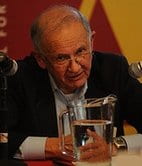 Former Ambassador Morton Abramowitz, who previously headed the State Department‘s intelligence unit, accused the press of “hit-and-run” coverage that has substituted for serious consideration of policy in Afghanistan. His observations, along with presentations and dialogue among top journalists, scholars and government officials, were presented at the inaugural Global Communication Leadership Forum
Former Ambassador Morton Abramowitz, who previously headed the State Department‘s intelligence unit, accused the press of “hit-and-run” coverage that has substituted for serious consideration of policy in Afghanistan. His observations, along with presentations and dialogue among top journalists, scholars and government officials, were presented at the inaugural Global Communication Leadership Forum ![]() , held November 6-7 in Los Angeles.
, held November 6-7 in Los Angeles.
“I have followed with increasing anger the way the media has covered the policies of the Obama Administration and their inadequacies,” Abramowitz said. “In Afghanistan, after the initial victory, the media and thus the country [U.S.] virtually abandoned their interest, turning attention and resources to the bigger issue of the day: Iraq. The press gave a virtual bye to Obama’s Afghanistan strategy in March. No one pursued the real questions: Who is the real enemy? How many forces should we send, for how long, with what strategy, to what end?”
“If the press doesn’t do anything to generate interest among the public or the government, maybe another sort of watchdog is needed,” he concluded.
The Global Communication Leadership Forum on Obama’s Afghanistan: The Media and the War ![]() was presented by USC Annenberg’s Center on Communication Leadership and Policy (CCLP) and Occidental College’s Office of Global Affairs.
was presented by USC Annenberg’s Center on Communication Leadership and Policy (CCLP) and Occidental College’s Office of Global Affairs.
Speakers at the weekend meeting also urged Obama to be extremely cautious in seeing a military buildup as an answer to the Afghanistan war.
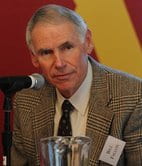
In order to win this challenge, said retired Admiral William J. Fallon, the U.S. needs to have a more accurate understanding of the needs and wants of the Afghan people. Part of this begins with the press. “One of the challenges for the media is to stay away from making this white or black,” he urged. But even if all the pieces come together, Fallon said there is no doubt in his mind the war will last longer than currently anticipated. “The very idea that we think it could happen soon seems pretty preposterous,” he said.
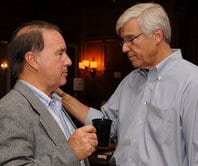
The conference, organized by Geoffrey Cowan, USC University Professor and CCLP director, and Derek Shearer, former U.S. Ambassador, Chevalier Professor of Diplomacy and World Affairs and director of global affairs at Occidental College, also featured distinguished journalists and policymakers, including Los Angeles Times reporter, Marjorie Miller; former U.S. Ambassador to Croatia, Peter W. Galbraith; Roy Gutman, author of Crimes of War: What the Public Should Know, senior political analyst for CNN, Bill Schneider; as well as CCLP Senior Fellows Jeremy Curtin and Cinny Kennard.
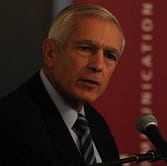
Retired General Wesley Clark, former NATO Supreme Allied Commander, spoke at the end of the conference’s first day, urging journalists and policymakers “to ask some tough questions” to help guide President Obama’s decisions about the war in Afghanistan. ”
We’re up against some really difficult problems and yet, it is not about troop strength. But that’s all people are talking about,” the general said. He suggested the press should ask about the defeat mechanism in Afghanistan instead of focusing on troop size.
Earlier, Afghan journalist Nushin Arbabzadah, currently a senior fellow at UCLA’s Center for India and South Asia, highlighted the media revolution in Afghanistan, citing the emergence of 21 new television stations, 27 new newspapers, more than 900 new web blogs and countless radio stations since 2001. ”
Now media freedom is part of the (Afghan) constitution,” said Arbabzadah, describing a previous society in which the press was not allowed to criticize the president. She has seen major changes within the mindsets of the Afghan people as a direct result of more press outlets.
“I think the most important consequence of the new media in Afghanistan is the demystification of politics,” she said, adding the press has also provided a forum to discuss issues that were formally considered social taboos, like sexual abuse, drug addiction and prostitution. “The Afghan public opinion is now accessible in a public way.”
Shearer opened the forum with an explanation of the reason behind the gathering. “The media was not doing a very good job reporting and analyzing the war in Afghanistan, particularly the United States’ involvement. Has there been adequate debate?”
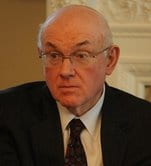 In his presentation, Public Opinion: How Americans See the War, CNN senior political analyst Bill Schneider summarized what is seen as a lack of public opinion about the war. “To many, many Americans, this year Afghanistan is a new war. We’ve been there for eight years. Afghanistan became the forgotten war.” Schneider believes the lack of American opinion and interest in Afghanistan stems from the popular view the war is a risky fight for someone else’s corrupted government.
In his presentation, Public Opinion: How Americans See the War, CNN senior political analyst Bill Schneider summarized what is seen as a lack of public opinion about the war. “To many, many Americans, this year Afghanistan is a new war. We’ve been there for eight years. Afghanistan became the forgotten war.” Schneider believes the lack of American opinion and interest in Afghanistan stems from the popular view the war is a risky fight for someone else’s corrupted government.
Because the American public interest level is so low, it is unlikely the U.S. will have the resources to make informed choices, said former CENTCOM commander, retired Admiral William J. Fallon. He stressed the Afghan people will ultimately create their own destiny saying, “We can do all kinds of things, but it doesn’t matter too much if they decide they want to do something different.”
Unlike Arbabzadah’s positive portrayal of Afghan media, Fallon painted a different picture. “Trying to communicate with those people is the biggest challenge I’ve seen anywhere in the world,” Fallon said. “Afghanistan is not a place that lends itself to, ‘We’re here to help.’ There’s ample evidence that we need to be very, very careful about how we introduce military presence.”
Fallon said the U.S. needs to have a more accurate understanding of the needs and wants of the Afghan people to win this challenge. Part of this begins with the press. “One of the challenges for the media is to stay away from making this white or black,” he said.
Even if all the pieces come together, Fallon said there is no doubt in his mind the war will last longer than currently anticipated. “The very idea that we think it could happen soon seems pretty preposterous,” he said. During an open discussion following Fallon’s address, Arbabzadah agreed with his suggestion that the U.S. must understand the Afghan people.
“People don’t listen to us! The image of Afghanistan in America is stuck,” she said, reminding the room “these are people who haven’t decided” with whom they side.
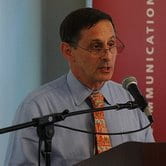 McClatchy foreign editor Roy Gutman delivered a presentation on How the Press Can Miss the Story in which he stressed the importance of reporting from the “ground level” to capture the full story.
McClatchy foreign editor Roy Gutman delivered a presentation on How the Press Can Miss the Story in which he stressed the importance of reporting from the “ground level” to capture the full story.
Gutman offered suggestions to the press to “master this story.” He said the press must cover the human rights angle, citing the United States’ silence when thousands of civilians were killed in 1998 after the Taliban returned to Mazar, among other examples.
Despite the incredible difficulty to attain accurate information, Gutman asked the press to examine the Taliban and its actions. He also described the importance of “reminding the public of the big picture: the disastrous past involvement of Pakistan and the calamity that will follow a collapse of Afghan central power.”
Not only must the media examine happenings abroad in Afghanistan, it needs to look domestically at the way in which people closest to the president publicly debate his decisions, Gutman said. “We can ask him why he runs his shop this way, without giving leadership,” he suggested.
The media must ask the government how it can risk military lives “if it cannot answer questions from the independent news media,” Gutman said. “It’s not just because we have a historic debt. It’s because finding out what’s really going on at the ground level is our job description anyway.”
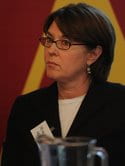 Los Angeles Times senior writer Marjorie Miller agreed with Gutman’s call for more “boots on the ground reporting” but said the economic downturn has greatly hindered foreign coverage.”It’s the job of the journalist to look at what the governments are doing, not what they are saying,” Miller said during a panel discussion with CCLP’s Cinny Kennard and National Public Radio‘s Mike Shuster. “In order to that, we need resources and we need access.”
Los Angeles Times senior writer Marjorie Miller agreed with Gutman’s call for more “boots on the ground reporting” but said the economic downturn has greatly hindered foreign coverage.”It’s the job of the journalist to look at what the governments are doing, not what they are saying,” Miller said during a panel discussion with CCLP’s Cinny Kennard and National Public Radio‘s Mike Shuster. “In order to that, we need resources and we need access.”
 Shuster said not only are media outlets denied access, but also they are bullied by the administration. “The government has a great deal of power, whether Democrat or Republican, to intimidate the press…particularly in matters of war and warfare,” he said.
Shuster said not only are media outlets denied access, but also they are bullied by the administration. “The government has a great deal of power, whether Democrat or Republican, to intimidate the press…particularly in matters of war and warfare,” he said.
All three journalists highlighted the expensive nature of traditional foreign reporting, especially in a country like Afghanistan, which is becoming more and more dangerous. They agreed new methods are needed. “In all this grimace what is emerging are new ways to cover the news,” Kennard said. She offered a solution to the conference’s focal question. “Instead of shooting the messenger, we need to encourage the American public to find other ways to access the information.”
During his presentation and overview from the position of the military, Clark compared the war in Afghanistan to the Vietnam War saying the way in which the “big institutions” interact has changed very little in the last several decades. “The military is very loyal,” Clark said explaining the military’s relationship to the President. “That’s the way you want the military, but it doesn’t always ask the questions you want it to ask,” he said emphasizing the press’ imperative role in influencing the decisions our government makes in foreign policy. “These questions have to be asked from the outside as well as on the inside,” he stressed. To help emphasize his point, he played a memorial video featuring footage and pictures of fallen troops from the Vietnam War. <
“These were my boys,” he said with emotion. “That’s why the president better take some time to get it right,” Clark said after the video. “And he’s not going to get it right unless you help him.”
Reported by Kirstin Heinle, USC Annenberg Graduate Student.
Additional reporting by David Westphal and Lisa Horowitz.